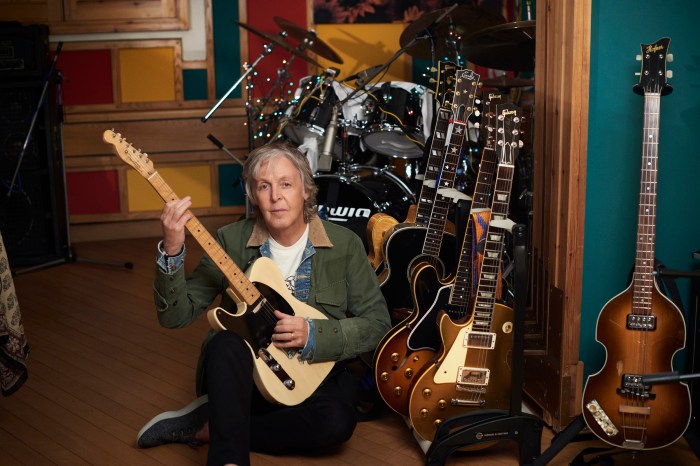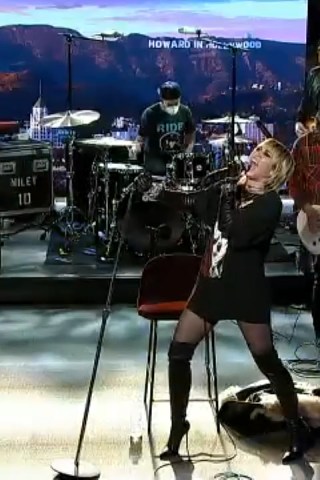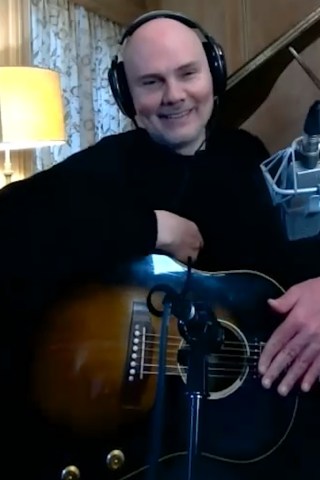Paul McCartney on ‘Sgt. Pepper’s’ Origins, Getting Discovered by John Lennon, and Being the ‘Cute Beatle’
Beatles legend returns to Stern Show ahead of “McCartney III”
December 15, 2020
He might be a two-time inductee into the Rock and Roll Hall of Fame but there was a time when not even Sir Paul McCartney’s music teacher knew what was ahead. “I was not any kind of prodigy,” the Beatles legend told Howard on Tuesday before describing a school instructor who would put on Beethoven records and just leave the classroom. “That was fatal – we immediately took that record off, got the cigarettes out [and] posted a guard on the door.”
In his first Stern Show appearance since April, Sir Paul spoke with Howard about everything from how the iconic “Sgt. Pepper’s” album came to be, how it was John Lennon who first discovered his musical talents, and the recording process for his latest album, “McCartney III.” Check out those highlights and more (below).
John Lennon, Talent Scout?
Despite not paying attention in class, Paul discovered his love and talent for music at an early age – even writing what would eventually become the Beatles classic “When I’m Sixty-Four” at the age of 15. “We had a piano in the house … I wrote the tune, I didn’t write the words – those came later,” Paul recalled to Howard. “I was just fascinated, you know, with music … this whole idea that you can sit down and there’s nothing except you start playing and then there’s a song – I find that magical.”
As he tells it, not everyone he came across was as enthralled. “Nobody was remotely interested in this idea of I wrote songs,” Paul said before admitting most were more interested in talking about soccer with him than his craft. “It wasn’t special until I met John … I said, ‘I’ve written a few songs’ and he said, ‘Oh, so have I’ … and that’s what started it all.”
A local musician in the Quarrymen, Paul would spot John in town. “I’d seen him around Liverpool … he got on a bus once and I said, ‘Whoa, look at this guy,’” he noted before joking about the breath of his eventual collaborator. “I was looking up at to him. I wasn’t that impressed because he smelled of beer and I was a little bit younger and I wasn’t too keen on this big smelly breath leaning over me.”
Eventually, Paul was able to look past the beer and was even offered a spot in John’s band – though he didn’t immediately say yes. “I don’t rush into things, I think I’m allowed to have a minute to think about it,” he explained of his decision-making process. “I’d never been in a band. Do I want to be in this band? So I just took the luxury of having a few days and I decided, ‘Yeah, you know, we can do something with this band.’”
“With a Little Help from My Friends”
Morphing into the Beatles, they did in fact do something with the band – not only did John and Paul become songwriting partners, but the latter would often help the former with his insecurities. “John did not have a great life in that department, in the family department,” he told Howard of Lennon who grew up without his father and lost his mother and uncle at a young age. “I think that led to a lot of John’s angst.”
Paul went on to explain that because they knew each other before any level of fame hit, he was able to be a sounding board for Lennon. “If John had a moment of insecurity, like we all do, I would be able to kind of talk to him about it,” he revealed, even recalling when John worried about what his legacy would be after he died. “I said, ‘You are kidding me … you are a legend already, never mind when you die.’ I had to reassure him … but that was the nice thing about our relationship, that I think we respected each other.”
“Sgt. Pepper’s”
After several years of unprecedented mainstream success with the Beatles, Paul was labeled “the cute one,” something that bothered the icon. “I hated that,” he admitted to Howard before making light of it. “Once it’s said it kind of sticks, but I just can’t help being cute … they just had to say, ‘He’s the cute one, he’s the quiet one, he’s the witty one, and he’s the drummer.”
Being put into such boxes is what at least partially led to the group’s making of 1967’s experimental and highly influential “Sgt. Pepper’s Lonely Hearts Club Band.” Other factors were Paul’s musical tastes at the time as well as, strangely, condiments. “I was listening to a lot of kind of offbeat music … crazy stuff like John Cage,” McCartney noted before explaining how he came up with the name Sgt. Pepper while on an airplane. “I was coming on the plane with our roadie … he said, ‘Pass the salt and pepper’ and I thought he said Sergeant Pepper. The whole concept was for us to pretend to be someone else so that’s why the uniforms … it was just a way to remove ourselves from just being Beatles and not be fed up with being musicians.”
The idea worked. “It allowed us to do crazier things than we might otherwise have done,” Paul said. “I wasn’t me. I was this guy in this other group – it was freeing.”
Musical Generosity
“Sgt. Pepper’s” wasn’t the only time Paul slipped into character, having used an alter ego to pen hits for some of his contemporaries. “I wrote a song for Peter and Gordon by Bernard Webb,” he explained to Howard of the song “Woman.” “I’ve used a couple of pseudonyms but it becomes known, it gets out.”
Though he also wrote a song for British Invasion rivals the Rolling Stones, Paul insists such unselfishness was a sign of the times. “The scene was generous,” Paul recalled. “We were all so excited that we were down in London and we all got recording contracts … so there wasn’t like any animosity. There is a rivalry but it isn’t a bad one.”
Friendly competition is a concept that exists for the legend to this day, even with newer acts such as Taylor Swift – she actually adjusted the December release of her latest album out of respect for his. “She found out we were coming out on the 18th so she moved back to the 10th, so people do keep out of each other’s way, which is a nice thing to do,” he stated.
An iPhone Full of Ideas
At the age of 78, Paul continues to be as prolific as ever, though even with all his successes the icon insists he doesn’t take the songwriting process for granted. “I don’t think … that automatically anything I write’s going to be good,” he explained. “No, I’m always judging it and going, ‘Is this any good … is this a joke?’”
At the same time, the legend tends to know when he’s got something of value. “You can tell if you’ve got a good song,” Paul told Howard. “You’re playing it and you go, ‘I like this, this is nice’ you know, and you’re excited to record it.”
Though the former Beatle now records his ideas on his iPhone and even played one of them – “John’s Boots” – for Howard, he recalled a time when it wasn’t so easy. “We used to say, ‘We’ve got to remember it’ and it worked,” Paul said of using a pen and paper as a recording device. “We’d write something and then we’d separate … come the evening I’d say, ‘What was that song we wrote today? Oh God, I’ve forgotten it.’ However, you’d sleep on it and the next morning the first thing that came into your head was that song.”
If anything, the approach was a recipe for success. “We used to say look, if we can’t remember it, how’s the people going to remember it so we have to write a memorable song,” Paul noted. “it was actually a good trick, really.”
“McCartney III”
As with earlier albums “McCartney” (1970) and “McCartney II” (1980), Paul plays all of the instruments on his latest, “McCartney III.” “I was sitting around with these tracks thinking, ‘What am I going to do with this?’ he remembered thinking. “And then a little lightbulb went off. I thought, ‘You’ve played all the instruments, this is ‘McCartney III.’”
In fact, the whole thing was a happy accident, born out of being isolated during the COVID-19 pandemic. “The lovely thing for me was, I seriously didn’t know I was making an album and so there’s a whole different feel, there’s no sweat,” Paul admitted. “It definitely was this idea of not trying too hard … it’s got sort of a special quality because of that.”
And even if he was no longer making albums, the icon would still be making new music. “That whole thing is still my favorite thing to do in life,” he insisted. “If it all stopped tomorrow, I’d still pick up a guitar and try to write something because it’s a hobby.”
Paul McCartney’s latest album, “McCartney III,” is available Dec. 18.
























